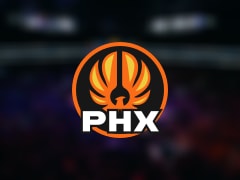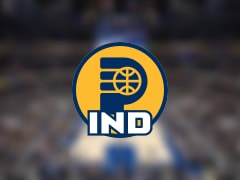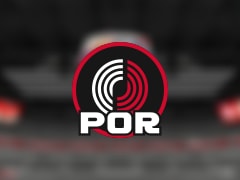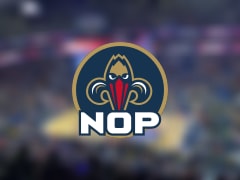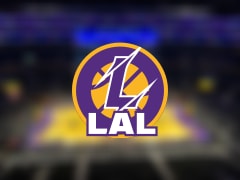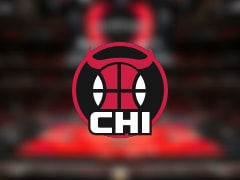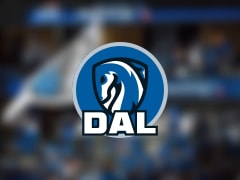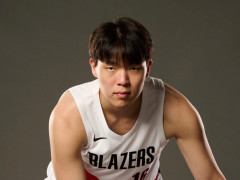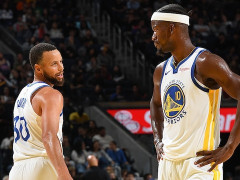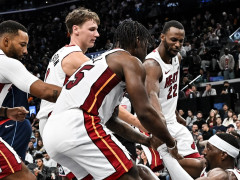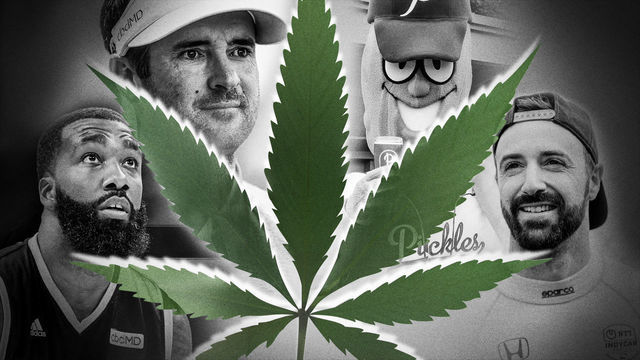
上个月,在独立日,波特兰酱菜举办了一场名为“未来棒球之夜”的一次性展览游戏 - 这项运动的重新设想。每个短打击中被裁定为双,并且击球手在奇数局中顺时针方向跑垒。如果需要,本垒打德比将上演打破平局。 p>
在组成夏季西海岸联盟的12个俱乐部中,只有Pickles曾想过组织D.B.库珀之夜。在六月的一个星期天,鼓励球迷带着关于劫机者命运的理论到达,他们的降落伞逃脱在过去的五十年里使美国当局神秘化。 p>
在波特兰的家庭公园沃克体育场的每一场比赛之夜,每当比利时赛跑的时候,球员和观众就会站起来。他们一起将凳子和草坪椅子抬向天空,对一个曾经投降自发并在牛棚中庆祝的救援投手持久点头。 p>
“如果我们得分很多,这是一次真正的训练,”Pickles老板Alan Miller说。 “看看那些没有去过那里的人,看看周围的事情真的很有趣,比如,'发生了什么事?'” p>
可以肯定地说,他们在波特兰以不同的方式做棒球比赛,那里有拟人化的蔬菜吉祥物名叫狄龙的皮克尔以永恒的微笑在场边徘徊,而另类的想法往往占上风。 p>
47岁的米勒是加利福尼亚州长大的棒球迷,他的大部分成年生活都是作为娱乐营销人员工作的。与他的同伴Pickles老板,前美国国家橄榄球联盟的下注者Jon Ryan一起,他正在进行一项自我描述的“追求”,以便在一项沉稳的运动中进行变革。波特兰没有另外一支棒球队,米勒相信每个Pickles的主场应该成为“城里最好的派对”。 p>
这就是Pickles最近与北美其他地区的体育景观脱颖而出的条件。本赛季,他们成为第一支与CBD品牌达成赞助协议的棒球队 - 一种新型的合作伙伴关系,如果态度发生变化,很快就会渗透到各大联盟。 p>
关于CBD或大麻二酚的快速入门:它是大麻植物中发现的化合物,不会让用户高。 (THC,或四氢大麻酚,是精神活性成分。)轶事和一些临床试验表明,从大麻中提取的CBD油可以帮助控制疼痛和其他医疗条件,而不会产生阿片类药物的有害影响。消费者需求飙升。 p>
研究大麻市场的芝加哥研究公司Brightfield Group预测,到20122年,大麻衍生的CBD产业的价值将从2018年的5.91亿美元增加到220亿美元。纯粹的财务条款,长期以来一直对啤酒公司感兴趣的联盟可能想要一块广告费。 p>
迄今为止,与CBD运动保持一致的兴趣大多局限于美国体育界的边缘,例如相对模糊的西海岸联盟。虽然在今年的MLB选秀中选出了90名WCL校友,其中包括排名第一的Adley Rutschman,但它甚至都不是全国最着名的夏季棒球比赛。 (这种区别属于更古老的科德角联盟。) p>
然而,即使与大公司闪亮的灯光相距甚远,泡菜与西雅图CBD生产商Lazarus Naturals的协议也标志着步。 p>
在本周末结束的常规赛季的每一个Pickles主场比赛中,Lazarus员工都将自己定位在靠近右侧区域的地方,出售精选的公司产品 - 例如CBD酊剂和香膏 - 并回答任何问题。关于实质的问题。带有Lazarus标志的横幅悬挂在公园周围。该团队已邀请退伍军人观看Lazarus品牌的游戏,该游戏位于本垒板和对方防空洞之间的黄金观赏区域内。 p>
一些粉丝一直担心拉撒路在公园的存在;其他人错误地认为该公司相对低调的销售摊位会像一个总店。不过,米勒已经发现绝大多数都是接受性的 - 开放购买CBD产品,或者至少要了解更多信息。 p>
“作为一个体育团队,或任何企业,我认为我们有义务进步,”米勒说。 “由于与大麻的混淆以及所有不同元素如何发挥作用,CBD周围存在负面耻辱,这是一种大麻衍生产品,有些则不然。但是对我来说,帮助打开那扇门让人们更容易接触是非常重要的。 p>
“在一天结束时,”他继续道,“这是一款帮助人们的产品。” p>
越来越多的人认为,这种信念在很多运动中都有所收获,远远超出了沃克体育场的舒适范围。 p>
参加赛车的IndyCar系列赛,James Hinchcliffe和Marcus Ericsson驾驶着一辆带有CBD的运动饮料Defy的标志驾驶着他们的车。网球运动员John Isner支持Defy,职业足球名人堂成员Terrell Davis帮助创造。 PGA巡回赛老将Bubba Watson由北卡罗来纳州的品牌cbdMD赞助,该品牌也是BIG3篮球联赛的官方球衣补丁提供商。 p>
“体育真的是开始讲道和教育不同受众的完美方式,从整体而言,CBD是一种更自然的健康方法,”cbdMD首席营销官Ken Cohn说。 “对于像Bubba和BIG3这样的主要合作伙伴,我们认为我们将以数百万人的方式获得CBD品牌和我们的故事,否则我们将无法实现。” p>
2017年与Ice Cube共同创办BIG3的娱乐主管Jeff Kwatinetz表示,他的联盟与cbdMD的交易符合其关注球员的首要愿望。夏季周末在美国各城市举行的三对三篮球赛道,已成为职业生涯末端数十名前NBA球员的登陆点,从吉尔伯特·阿里纳斯到阿玛雷·斯塔德迈尔,再到目前的每场比赛得分领袖乔约翰逊。 p>
这些玩家多年来一直承受着巨大的痛苦,这促使BIG3在2018年允许使用CBD。几家公司随后向联盟寻求合作伙伴关系。截至本季,cbdMD标志装饰了每件BIG3制服。 p>
“对于我们做出决定,我不得不关注:对我们的粉丝说什么是正确的信息?” Kwatinetz说。 “我有一个20个月大的女儿。如果她需要疼痛(缓解),我会想让她服用CBD或Oxycontin(有一天)吗?答案很简单。我想不惜一切代价避免使用阿片类药物,看看它们是怎样的”蹂躏社会。 p>
“我们的世界需要改善。我们可以提供任何帮助,我们希望提供帮助。当然,对于运动员来说,我们对他们负有责任,“他补充道,”我们认为这对社会有益。坦率地说,CBD很容易。“ p>
运动员宣传各种疼痛疗法的好处的传统早在CBD崛起成为主流之前。沙奎尔奥尼尔让Icy Hot补丁闻名于世。乔Namath过去常常拍摄芦荟凝胶的广告。5月,Namath告诉福克斯商业,他认为运动员应该被允许用大麻治疗疼痛,只要他们不在高处开车。 p>
在同一天Namath的评论发表后,UFC宣布计划与Aurora Cannabis合作,促进CBD与运动员健康和康复之间联系的临床研究.NHL校友会与另一家大麻生产商Canopy Growth达成了类似的安排。测试CBD是否可以帮助治疗脑震荡后神经系统疾病。 p>
随着这些研究的开展,广告空间代表了另一个晴雨表,可以衡量专业体育对CBD的容忍度。目前,所有的美国“四大联盟 - NBA,NFL,NHL和MLB--禁止他们的特许经营权作为赞助商签署CBD公司。 p>
美国国家橄榄球联盟没有讨论与CBD品牌合作的可能性,联盟通讯副总裁布莱恩麦卡锡通过电子邮件告诉theScore。 p>
NBA发言人在一封电子邮件中表示,联盟正在与其团队和球员协会讨论CBD,并“继续了解科学及相关法律和监管框架的最新发展。” p>
与此同时,美国CBD合法化的形式是一个大杂烩。管理其销售和占有的法律因城市和州而异。自2018年底以来,大麻的种植和销售在联邦层面是合法的,但到目前为止,国家食品药品监督管理局只批准了一种CBD产品,一种治疗罕见癫痫形式的处方药。 p>
加拿大安大略省圭尔夫大学营销学教授Timothy Dewhirst说这是可以理解的在将CBD品牌视为赞助商之前,高调的联盟可能希望等待FDA引入全面的法规。然而,即使最大的鱼仍然保持警惕,波特兰,美巡赛和其他地方已经存在的交易可能会对公众舆论产生强烈影响。 p>
“这种可见性(CBD公司)可以通过这些合作伙伴关系获得,特别是与像两次大师赛冠军Bubba Watson这样的人合作,如果他宣传这些产品及其产品的巨大好处安全等等,这可以大大有助于使他们被认为更具社会可接受性,“德惠斯特说。 p>
如果主要联盟将CBD产品线视为合适的合作伙伴,那么该产品在体育广告界的影响力可以与赌博业相媲美,Syracuse大学体育管理学教授Patrick Walsh在接受采访时表示。 NBA,NFL,NHL和美国职业棒球大联盟在过去13个月内都签署了官方赌场或博彩合作伙伴关系,2018年5月美国最高法院裁决允许各州将体育博彩合法化。 p>
美国职业足球大联盟没有回应有关其对CBD合作伙伴关系立场的评论请求,但它也表示愿意冒险进入市场曾被视为禁忌。在MLS与米高梅度假村建立自己的博彩合作伙伴关系三个月后,联盟授权其俱乐部与体育博彩和酒类公司进行体育场馆命名和球衣赞助交易,这是美国团体运动的第一次。 p>
“我们希望被视为一个进步的联盟,”MLS业务发展高级副总裁Carter Ladd当时告诉“财富”杂志。 “我们不想限制。我们希望以积极的方式启用(我们的俱乐部),这就是我们采取这一行动的原因。” p>
Pickles老板Miller追溯到1994年8月,当球员的罢工停止了MLB赛季,后来促使取消世界大赛时,他追求将棒球娱乐的界限推回原点。 p>
22岁,单身,住在洛杉矶,他在那个夏天剩下的闲暇时间与朋友们一起出发,探索附近的小联盟经历,从High-A Lake Elsinore开始暴风雨,每当主队得分跑动时,一个兔子吉祥物从外场墙边界开始执行一个小跳汰机。 p>
“那太好了,”米勒说。 p>
在互联网出现之前,米勒对美国不同地区的小联盟场景几乎一无所知,但在接下来的几年里,他远赴史坦顿岛和北卡罗来纳州达勒姆的球场。观察,欣赏和记忆使每个地方与众不同的怪癖和习俗。他心中的促销活动是那些看似真实的,对团队的城市有所放松的东西。 p>
在他最近一个下午回顾这段个人历史之前,米勒提到泡菜只有几个小时的时间才能举办特许经营的第一个Tattoo星期二,21岁或以上的任何人都可以在他们的皮肤上留下他们的粉丝。免费。正如他所说的那样,这只是在波特兰的另一天。 p>
与Lazarus Naturals的交易是米勒的快乐乐队主持人与现在分开的另一种方式。 Pickles致力于在未来几年建立合作关系,届时,如果更多的州立法机构开始采用俄勒冈州的宽松态度,他们可以在市场上拥有大量的公司。 p>
对于米勒来说,这不是什么时候,而是什么时候。 p>
“在三到五年内,它就像在任何其他公园买啤酒或买热狗一样,”他说。 “我不可能做到这一点,'我有百威特的协议,我有这个CBD公司的交易。'” p>
Nick Faris是theScore的特写作家。 p>
原标题:
CBD is here and companies have money to spend. Which sports are listening?
原文:
Last month, on Independence Day, the Portland Pickles hosted a one-off exhibition game dubbed Future of Baseball Night - a radical reimagining of the sport. Every bunt hit was ruled a double, and batters ran the bases clockwise during odd-numbered innings. If needed, a home run derby would have been staged to break a tie.
Of the 12 clubs that comprise the collegiate summer West Coast League, only the Pickles have ever thought to organize a D.B. Cooper Night. On a Sunday in June, fans were encouraged to arrive with theories about the fate of the skyjacker whose parachute escape has mystified U.S. authorities for the past five decades.
And on every game night at Portland's home park, Walker Stadium, players and spectators rise to their feet whenever the Pickles plate a run. Together they hoist their stools and lawn chairs toward the sky, an enduring nod to a relief pitcher who once surrendered to spontaneity and celebrated that way in the bullpen.
"If we score a lot of runs, it's a real workout," said Pickles owner Alan Miller. "It's really fun to watch people who haven't been there before look around, like, 'What is going on?'"
It's safe to say they do baseball differently in Portland, where an anthropomorphic vegetable mascot named Dillon the Pickle paces the sidelines with a perpetual smile, and where offbeat ideas tend to prevail.
Miller, 47, is a California-raised baseball obsessive who has spent most of his adult life working as an entertainment marketer. Along with his fellow Pickles owner, former NFL punter Jon Ryan, he's on a self-described "quest" to be transformative in a staid sport. Portland doesn't have another baseball team, and Miller is convinced that every Pickles homestand should double as "the best party in town."
Such are the conditions under which the Pickles recently distinguished themselves from the rest of North America's sports landscape. This season, they became the first team in baseball to strike a sponsorship deal with a CBD brand - a novel kind of partnership that, if attitudes change, could soon permeate the biggest leagues around.
A rapid-fire primer on CBD, or cannabidiol: It's the compound found in cannabis plants that doesn't get users high. (THC, or tetrahydrocannabinol, is the psychoactive component.) Anecdotal accounts and some clinical trials suggest that CBD oil extracted from hemp can help manage pain and other medical conditions without the deleterious effects of opioids. Consumer demand is skyrocketing.
The Brightfield Group, a Chicago research firm that studies cannabis markets, has predicted that the value of the hemp-derived CBD industry will balloon to $22 billion by 2022, up from a mere $591 million in 2018. In pure financial terms, it stands to reason that leagues that have long cozied up to beer companies might want a piece of that advertising money.
To date, though, interest in aligning with the CBD movement has mostly been limited to the fringes of American sports, such as the relatively obscure West Coast League. While 90 WCL alumni were selected in this year's MLB draft, including No. 1 overall pick Adley Rutschman, it isn't even the country's most prominent summer baseball competition. (That distinction belongs to the much older Cape Cod League.)
Yet even far removed from the shining lights of the majors, the Pickles' pact with Lazarus Naturals, a CBD manufacturer based in Seattle, marks a significant step.
At every Pickles home game during the regular season, which concludes this weekend, Lazarus employees have positioned themselves in an area near right field to sell select company wares - such as CBD tinctures and balm - and to answer any questions about the substance. Banners bearing the Lazarus logo hang around the park. The team has invited military veterans to watch games from a Lazarus-branded box, situated in prime viewing territory between home plate and the opposing dugout.
Some fans have been apprehensive about Lazarus' presence at the park; others mistakenly thought the company's comparatively understated sales booth would resemble a head shop. Miller, though, has found the vast majority to be receptive - open either to purchasing a CBD product or, at least, to learning more about it.
"As a sports team, or as any business, I think we have an obligation to be progressive," Miller said. "There's a negative stigma around CBD because of the confusion with cannabis and how all the different elements work, and this is a hemp-derived product and some are not. But it was important to me to help open that door and make it a bit more accessible to people.
"At the end of the day," he continued, "this is a product that is helping people."
Increasingly, this conviction is gaining purchase across a number of sports, well beyond the snug confines of Walker Stadium.
Take auto racing's IndyCar Series, where James Hinchcliffe and Marcus Ericsson drive with the logo of a CBD-infused sports beverage, Defy, on their cars. Tennis player John Isner endorses Defy, which Pro Football Hall of Famer Terrell Davis helped create. PGA Tour veteran Bubba Watson is sponsored by cbdMD, a North Carolina-based brand that's also the official jersey patch provider of the BIG3 basketball league.
"Sports are really the perfect way to begin preaching and educating a diverse audience on how CBD, holistically, represents a more natural approach to wellness," said Ken Cohn, cbdMD's chief marketing officer. "With major partners like Bubba and the BIG3, we think we're getting the CBD brand and our story in front of millions of people in ways that otherwise we wouldn't be able to accomplish."
Jeff Kwatinetz, the entertainment executive who co-founded the BIG3 with Ice Cube in 2017, says his league's deal with cbdMD falls in line with its overarching desire to take care of players. The three-on-three basketball circuit, which barnstorms across U.S. cities on summer weekends, has become a landing spot for dozens of former NBAers at the tail end of their careers, from Gilbert Arenas to Amar'e Stoudemire to current per-game scoring leader Joe Johnson.
These players have subjected their bodies to a whole lot of pain over the years, which prompted the BIG3 to permit the use of CBD in 2018. Several companies subsequently approached the league about a partnership. As of this season, the cbdMD logo adorns every BIG3 uniform.
"For us to make the decision, I had to look at: What's the right messaging toward our fans?" Kwatinetz said. "I have a 20-month-old daughter. Would I would want her taking CBD or Oxycontin (someday) if she needed pain (relief)? The answer is simple. I would want to avoid opioids at all costs, seeing how they're ravaging society.
"Our world needs to be improved. Any way that we can help, we want to help. And certainly with athletes, we feel a responsibility to them," he added. "It's doing things we believe are better for society. CBD, frankly, was an easy one."
The tradition of athletes trumpeting the benefits of various pain remedies long predates CBD's ascent into the mainstream. Shaquille O'Neal made Icy Hot patches famous. Joe Namath used to shoot commercials for aloe vera gel. In May, Namath told Fox Business that he thinks athletes should be allowed to treat pain with marijuana, so long as they don't drive while high.
On the same day as Namath's comments were published, the UFC announced that it planned to partner with Aurora Cannabis to facilitate clinical research into the link between CBD and athlete wellness and recovery. The NHL Alumni Association has a similar arrangement in place with another cannabis producer, Canopy Growth, to test whether CBD could help treat post-concussion neurological diseases.
As these studies get underway, the advertising space represents another barometer with which pro sports' tolerance for CBD can be gauged. At the moment, all of the United States' four major leagues - the NBA, NFL, NHL, and MLB - prohibit their franchises from signing CBD companies as sponsors.
No discussion has taken place at the NFL about the possibility of partnering with CBD brands, Brian McCarthy, the league's vice president of communications, told theScore via email.
An NBA spokesperson said in an email that the league is discussing CBD with its teams and the players' association and is "continuing to stay abreast of the latest developments in the science and related legal and regulatory frameworks.”
Meanwhile, the shape of CBD legalization across the U.S. is a hodgepodge. Laws governing its sale and possession vary by city and state. The cultivation and sale of hemp has been legal at the federal level since late 2018, but the national Food and Drug Administration has so far approved just one CBD product, a prescription drug that treats rare forms of epilepsy.
Timothy Dewhirst, a marketing professor at Guelph University in Ontario, Canada, said it's understandable that high-profile leagues may want to wait for the FDA to introduce comprehensive regulations before considering CBD brands as sponsors. Yet even if the biggest fish remain wary, the deals that already exist in Portland, the PGA Tour, and elsewhere could have a potent effect on public opinion.
"That kind of visibility (CBD companies) can gain by these partnerships, and especially a partnership with someone like Bubba Watson, a two-time Masters champion - if he's touting the great benefits of these products and their safety and so on, that can go a long way to making them deemed far more socially acceptable," Dewhirst said.
If the major leagues come to view CBD lines as appropriate partners, the inroads that the product makes into sports advertising circles could compare to those of the gambling industry, Syracuse University sports management professor Patrick Walsh suggested in an interview. The NBA, NFL, NHL, and MLB have all inked official casino or gaming partnerships within the past 13 months, a sea change made possible by the May 2018 U.S. Supreme Court ruling that allowed states to legalize sports betting.
Major League Soccer didn't respond to requests for comment about its stance on CBD partnerships, but it, too, has displayed a willingness to venture into markets once considered taboo. In June, three months after MLS struck its own gaming partnership with MGM Resorts, the league authorized its clubs to pursue stadium-naming and jersey-sponsorships deals with sports betting and liquor companies, a first in U.S. team sports.
"We want to be viewed as a progressive league," MLS senior vice president of business development Carter Ladd told Fortune at the time. "We don't want to be restrictive. We want to enable (our clubs) in a positive way, and that's why we're taking this action."
Miller, the Pickles owner, traces his desire to push the boundaries of baseball entertainment back to August 1994, when a players' strike halted the MLB season and later prompted the cancellation of the World Series.
At 22 years old, single, and living in Los Angeles, he set out with friends on idle days throughout the rest of that summer to discover nearby minor-league experiences, starting with the High-A Lake Elsinore Storm, where a bunny mascot bounded from the outfield wall to perform a little jig every time the home side scored a run.
"That was too good," Miller said.
Ahead of the advent of the internet, Miller knew little about the minor-league scene in different pockets of the U.S., but in the following years he journeyed to ballparks as far away as Staten Island and Durham, N.C., observing, appreciating, and memorizing the quirks and customs that made each place different. The promotions that stuck in his mind were those that seemed authentic, having amplified something cool about the team's city.
Before he recounted this personal history one recent afternoon, Miller mentioned that the Pickles were hours away from holding the franchise's first Tattoo Tuesday, where anyone aged 21 or older could have a mark of their fandom etched into their skin free of charge. It was, as he put it, just another day in Portland.
The deal with Lazarus Naturals is one more way in which Miller's merry band of chair-raisers stand apart from the pack - for now. The Pickles are committed to the partnership for the next couple of years, by which point, if more state legislatures begin to adopt Oregon's lenient approach, they could have plenty of company in the market.
To Miller, it's less a matter of if than when.
"In three-to-five years, it's just going to be like buying a beer or buying a hot dog at any other park," he said. "There's no way it isn't going to be, 'I have a Budweiser deal and I have this CBD company deal.'"
Nick Faris is a features writer at theScore.

